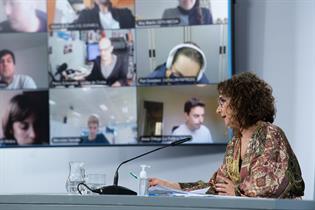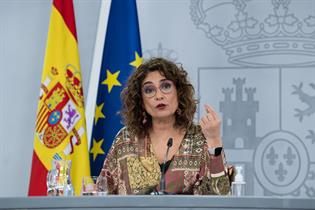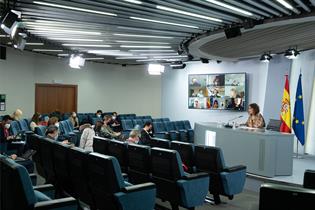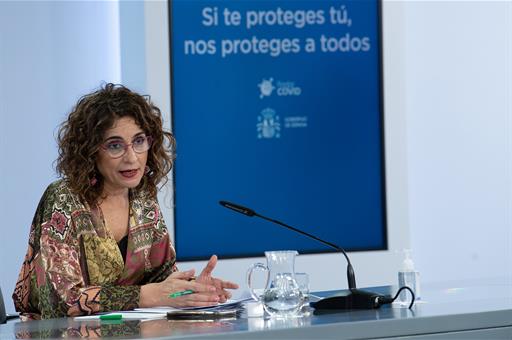Council of Ministers
Government approves acquisition of 17 million additional doses of Moderna vaccine
Council of Ministers - 2021.3.2
Moncloa Palace, Madrid
The Council of Ministers agreed to sign up to the new European Commission negotiation process with the pharmaceutical company Moderna to increase the number of doses available to further develop the European Vaccine Strategy.
The Minister for the Treasury and Government Spokesperson, María Jesús Montero, explained that the European Union will acquire 150 million additional doses, of which 17 million will correspond to Spain, which will be progressively distributed to the regional governments in the second half of the year; specifically, 5.6 million doses in the third quarter and 11.3 million in the fourth.
The amounts announced come on top of the 16 million doses of the Moderna vaccine that Spain will receive from the initial purchase agreed back in November which will allow the regional authorities to continue complying with their vaccination calendar.
The Government of Spain has invested almost 1.9 billion euros to date in the different vaccines that have been commercialised.
The government also approved, through the fast-track procedure, a storage and distribution service for the AstraZeneca vaccine, for the sum of 1 million euros. María Jesús Montero argued that this "procurement was essential" for the medication to arrive at the distribution points in optimal condition and thus maintain its efficacy.
More people vaccinated with the first dose than infected
 Foto: Pool Moncloa/Borja Puig de la BellacasaMaría Jesús Montero highlighted that the number of people infected with the coronavirus is dropping in relation to the cumulative incidence in the last seven days.
Foto: Pool Moncloa/Borja Puig de la BellacasaMaría Jesús Montero highlighted that the number of people infected with the coronavirus is dropping in relation to the cumulative incidence in the last seven days.
Spain, indicated the Government Spokesperson, is one of the countries to have made the most progress in vaccinations. Thanks to the efforts of the regional governments and the Ministry of Health, the doses are being administered at a sufficient rate and there are now "more people vaccinated with the first dose than have been infected", she remarked.
The minister specified that a total of 4.5 million doses of the Pfizer-BionTech, Moderna and AstraZeneca vaccines have now been distributed, of which 4 million have been administered. "Around 1.3 million people have received the full vaccination".
She also highlighted that Spain remains on target for vaccinating 70% of the population during the summer. On this point, María Jesús Montero conveyed the government's recognition of the huge task being performed by healthcare workers.
The Government Spokesperson pointed out that, as the days go by we can see clear evidence of this. "The vaccines are safe medicines, and provide incalculable aid in controlling this pandemic because the studies show the reduction in the number of hospital admissions, as occurred in care homes for the elderly, and the capacity for halting the spread of this disease".
However, the minister reiterated that "until such time as we have herd immunity, we must not relax the measures or leave any cracks open for the virus to exploit".
Caution and prudence regarding the movement of people
When asked about the possibility of travelling at Easter, the Government Spokesperson called for "caution and prudence" in relation to any question regarding the movement of people in order to prevent an increase in personal contact.
The health authorities, she said, will have to look, depending on the situation in each region and the epidemiological data, at the specific measures to apply. The government, added María Jesús Montero, calls for prudence so as to avoid an abrupt de-escalation that leads to a fourth wave
María Jesús Montero also stated that Spain will continue to work within the framework of the European Union to agree on criteria that lead to the introduction, as from May or June, of a vaccination "passport", which not only includes those people vaccinated, but also those who have had the disease or have undergone a PCR test.
The aim, she stated, is to ensure safe corridors to reactivate tourism without endangering public safety, as demanded by the President of the Government, Pedro Sánchez, at the latest European Council.
8 March - International Women's Day
 Foto: Pool Moncloa/Borja Puig de la BellacasaThe Council of Ministers approved an institutional statement on the occasion of International Women's Day which will be held on Monday, 8 March.
Foto: Pool Moncloa/Borja Puig de la BellacasaThe Council of Ministers approved an institutional statement on the occasion of International Women's Day which will be held on Monday, 8 March.
María Jesús Montero reiterated the government's commitment to work on eliminating the difficulties that women face in finding a job and being promoted, in achieving equal pay, in obtaining the same representation as men on senior political, economic and judicial bodies, and in the fair distribution of domestic tasks and care work.
María Jesús Montero also regretted that violence continues to be perpetrated against women simply for being so. Since 2003, 1,081 women have been murdered in Spain at the hands of their partner or former partner. The latest potential victim was a woman in Torrejón de Ardoz (Madrid), which, if confirmed, would be the fourth victim of male violence this year.
General guidelines of the 2030 Sustainable Development Strategy
The Council of Ministers analysed the report on the general guidelines of the Sustainable Development Strategy for the year 2030.
The document stresses the need to address, among other challenges for the next decade, job insecurity, the gender gap, the environmental emergency and the financing and upgrading of public services.
María Jesús Montero thanked the regional governments and autonomous cities, local authorities, the private sector, NGOs and third sector entities for their contributions to drafting the document.
New General Lawyers' Statute
The government has renewed the conditions for membership of associations by lawyers, together with the rules on the functioning of law associations and the General Council of the Judiciary. The new General Lawyers' Statute will come into force on 1 July and will replace the present statute, which dates back 20 years.
The Government Spokesperson highlighted, by way of new features for legal professionals, the regulation of the right to continuous and specialised training, the introduction of a new regime on disciplinary responsibility, the promotion of a work/life balance and effective equality between men and women on collegiate bodies.
Furthermore, to enhance transparency and improve information and attention for citizens and users, the law association one-stop shop will be set up and the obligation to publicise their services on their web pages will be established.
Legacy of Santiago Ramón y Cajal
 Foto: Pool Moncloa/Borja Puig de la BellacasaThe Council of Ministers approved the creation of a Work Group to study and analyse the existing possibilities to guarantee the projection and spread of the legacy of Santiago Ramón y Cajal. The aim is to promote a space that rises to the level of the figure of the father of neuroscience, the 1906 Nobel Physiology and Medicine Prize-winner, and promote the spread of scientific research.
Foto: Pool Moncloa/Borja Puig de la BellacasaThe Council of Ministers approved the creation of a Work Group to study and analyse the existing possibilities to guarantee the projection and spread of the legacy of Santiago Ramón y Cajal. The aim is to promote a space that rises to the level of the figure of the father of neuroscience, the 1906 Nobel Physiology and Medicine Prize-winner, and promote the spread of scientific research.
María Jesús Montero explained that the Cajal Institute of the National Scientific Research Centre (Spanish acronym: CSIC) currently houses the set of laboratory pieces and belongings that Santiago Ramón y Cajal wanted to be stored and kept as a symbol of the first scientific research in Spain on the functioning of the central nervous systems.
The Work Group will be headed up by the Ministry of Science and Innovation and will include members from the Ministries of the Presidency, and of Culture, and the participation of members of the Royal Academies and other academies and experts from the economic, business and social fabric.
Constitutional challenge
The government agreed to lodge a constitutional challenge against Article 88 of the Regional Act of Catalonia on fiscal, financial, administrative and public sector measures and the creation of a tax on installations that affect the environment.
The Minister for the Treasury explained that the Regional Government of Catalonia has overstepped its jurisdiction in creating a new category affecting personal minimums under Personal Income Tax (Spanish acronym: IRPF). "This personal and family minimum can be raised to 10% under pre-defined concepts, but new categories may not be created".
María Jesús Montero regretted that an agreement could not be reached on this specific article of the law in the negotiations held at the Bilateral Cooperation Committee between Central Government and the Regional Government of Catalonia at which, in contrast, an agreement was reached on correcting the six other rules that could potentially be challenged in the same text.





